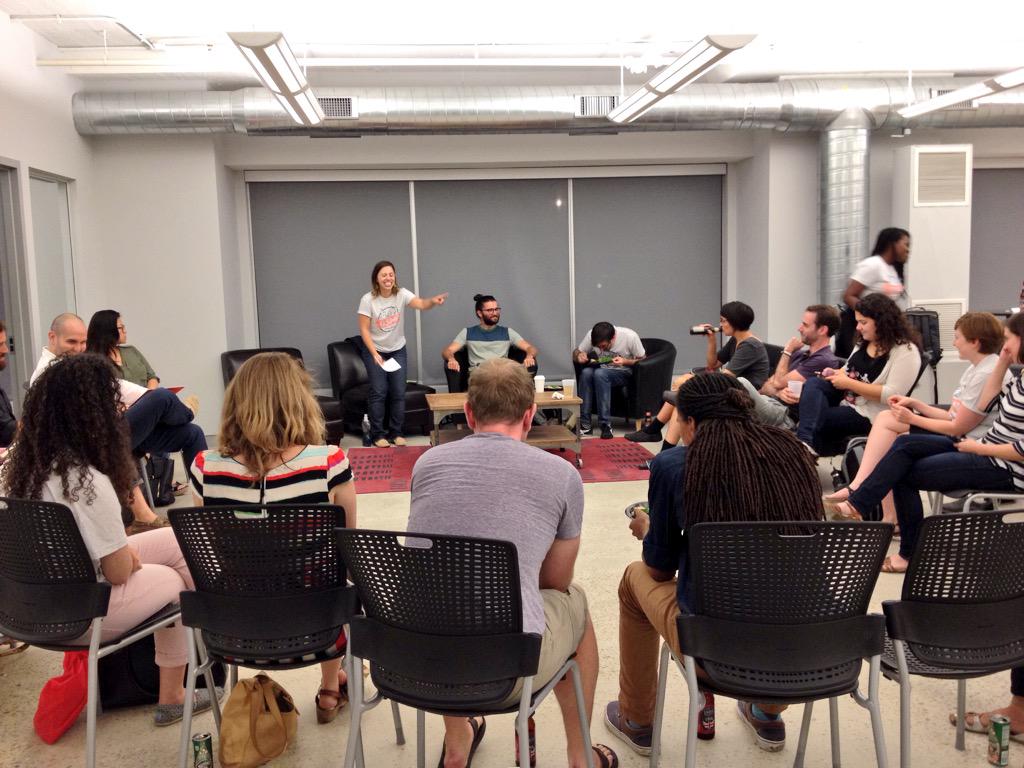The second annual Open Source Mentorship Program for women, run by Code for Philly and Girl Develop It, wrapped late last month.
The program aims to tackle the gender gap in open source technology. Other cities are taking note.
The seven women in the 10-week program worked with their mentors on apps like CyclePhilly, SEPTA Ninja and their own interactive maps at hack nights once a week.
We think it’s one of the most impressive programs in the Philadelphia tech scene. Here’s why.
1. It’s an entry point into the tech scene.
If we’re working toward a more equitable and inclusive tech scene, one way to get there is through entry points like these. Many of the mentees in the program, both this year and last year, said that they were intimidated by the tech scene or didn’t know how to get into it, and that the Open Source Mentorship Program helped them find their place in the community and make them feel comfortable at events like Code for Philly’s weekly hack nights.
There was an even stronger focus on that aspect this year. Co-organizer Ashley Bernard said that the end goal wasn’t building a finished project. “We hoped to present [mentees] with a springboard into developing for civic hacking and the Philly tech community,” Bernard wrote via email.

2. It feels like Philly’s grassroots tech efforts growing up.
It was striking to see leaders from Girl Develop It and Code for Philly hand over the reins to this year’s co-organizers Bernard and Maggie Deptola, both 24. (Code for Philly executive director Dawn McDougall helped develop the program’s structure, building off what Girl Develop It executive director Corinne Warnshuis and developer Cat Farman started.) It was a sign that these groups are thinking about how to make the program sustainable and also speaks to the broader vision of GDI and Code for Philly: the Open Source Mentorship Program is just one part of a larger civic technology and inclusivity effort.
It also offered an opportunity for others to take leadership roles in the tech scene. This was Deptola’s first foray into the civic hacking world. A environmental consultant who recently joined RJMetrics, she’s already thinking about how to improve the program next year.
As for Bernard, she was as a mentee in the program last year and has since been hired as a project manager at Manayunk’s Delphic Digital.
3. Mentors (and some mentees) came back for another year.
You’re doing something right if people come back.
Mentors like Chad Ostrowski, Matt McFarland, Yash Prabhu and Jim Smiley returned for a second year, and LeeAnn Kinney, who was a mentee last year, became a mentor.
4. It’s a tangible way to support diversity in tech.
It’s one thing to talk about how you want a more diverse staff. It’s another thing to invest in programs that are working to build that pipeline. Open Source Mentorship Program sponsors included local companies like Chariot Solutions, Delphic Digital, PromptWorks and Azavea (Azavea founder Robert Cheetham was at the program’s closing event).
“You showed us, by contributing, that we’re not alone in this mission of increasing the diversity of the tech scene,” Bernard said at the event.

5. Because it’s the first time we’ve seen technologists get paper-plate awards.
A pretty great moment. Every mentee made their mentors an award this year.
The material? Flimsy. The sentiment? Priceless.
https://twitter.com/_leekinney/status/636705277073575936
https://twitter.com/jimRsmiley/status/636693844583686144







